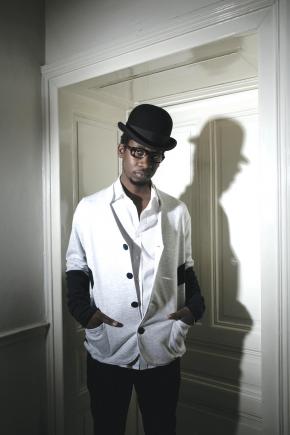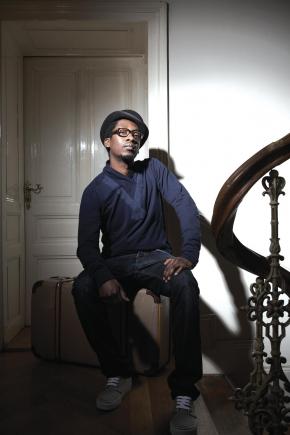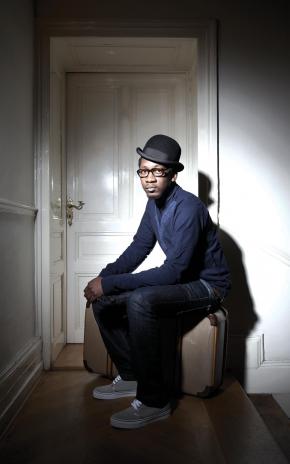KALAF ÂNGELO - “The more you travel, the more luck is on your side”
This Angolan poet and musician has captivated European audiences, but the journey has been long and hard. In Lisbon, he was able to show us the rich cultural heritage of sounds emerging from Africa which had hitherto been hidden. He drew on his experience and on sounds from Angola and meshed them with the latest sounds being played in Europe. His music speaks of new trends and of being a global citizen. These are some of the secrets behind his original sound.
 foto de Diana DjeddiKalaf Ângelo was born in Benguela and lived there until he was 17. His was a happy childhood, followed by gentle teenage years in the south. He fondly remembers the long afternoons with friends in the shade of the mango tree in his garden, making tin can cars on the doorstep of Mr. Flora’s shop. There were afternoons of racing tyres around the block or playing chess shaded under Robert’s wall. “That was the best spot on the street to catch the breeze and it was the perfect place to wait for the young farmgirls to walk past on their way to Camponte market from the train station.”
foto de Diana DjeddiKalaf Ângelo was born in Benguela and lived there until he was 17. His was a happy childhood, followed by gentle teenage years in the south. He fondly remembers the long afternoons with friends in the shade of the mango tree in his garden, making tin can cars on the doorstep of Mr. Flora’s shop. There were afternoons of racing tyres around the block or playing chess shaded under Robert’s wall. “That was the best spot on the street to catch the breeze and it was the perfect place to wait for the young farmgirls to walk past on their way to Camponte market from the train station.”
Later when he was a little older, he recalls his first romances at the gate and he can see himself in the Angola of the 1980s described by Ondjaki, “now it is hard for any of us to talk of it again.”
When Kalaf Ângelo came to Lisbon as a student in 1994, he didn’t rush to meet Africans in Rossio, nor did he seek out the Angolan community. What he wanted more than anything was to travel the world. This was just the beginning of a love affair with Lisbon, which he nicknamed Lisa, from light. Lisbon was known as a meeting point, as it kept its link with History alive, with its shared memories of slavery, Brazil, and Africa. But Kalaf felt that this was not very tangible, people listened more to Michael Jackson than any other African singer (Miriam Makeba, for example, was hardly known): these were the first steps taken on the road to today’s widely acclaimed encounter of Portuguese-speaking voices. Kalaf still feels at home here and reminds us that Lisbon is a launching pad for those looking for their own sound:
“I still believe that when the Portuguese-speaking revolution happens, Lisbon will undoubtedly have its say, but as to where it will be staged? Well, it could easily be Salvador, Huambo or São Tomé. Everything is changing and that makes everything much more fascinating.”
The meeting of lyrics and music
Kalaf started to write. He was curious about everything going on in the cultural world and this was (and continues to be) a phase to take things in. In this Lisbon of learning, art seemed to him the most compelling way to take part, as it was “neither academic nor colonial.” He wanted to understand what was happening all around him. In the meantime, a new direction was being forged by Kalaf in the form of music. He set up the record label Enchufada with a couple of friends, based in the quiet neighbourhood of Campo de Ourique. From here he has dedicated his time to the hits that have been among the most successful of recent times, from Buraca (a district on the outskirts of Amadora) to the world he brought us: The Buraka Som Sistema! The band (Kalaf is its rapper-MC) takes up all his time and energy: there are back to back tours to bring its music to the world and the band’s diary is chock full of engagements. Beyond his personal work on Buraka, Kalaf no longer has the time to perform spoken word sessions, outlets for his poetry, nor is he working on other music projects with Space Boys and Cool Train Crew. Now all he has time for is a weekly column in the Público newspaper. As a ‘painter of modern life’ (he is among the few African contributors writing in the Portuguese press) we learn a lot about his life, places he has seen, clothes he wears, trends, and a multitude of hi-tech gadgets from the age of global communication and any other subjects that take his fancy.
 foto de Diana DjeddiHis first trip home to Luanda after a long absence of 12 years was extremely inspiring (he became hooked on the much loved passion fruit Blue which he drank as soon as the plane landed). He felt that “there is a new way to hang out in Angola. I woke up to a world that was hard for everybody (end of the 1980s), today, it’s all about pluralism.” As well as catching up with friends and revisiting old haunts, Kalaf set about researching rappers and talented kuduro performers (including DJ Znobia, Puto Prata and others). On his return, he invited Angolan underground hip-hop performers to play alongside him at the S. Jorge cinema, at the show Ecos da Banda.
foto de Diana DjeddiHis first trip home to Luanda after a long absence of 12 years was extremely inspiring (he became hooked on the much loved passion fruit Blue which he drank as soon as the plane landed). He felt that “there is a new way to hang out in Angola. I woke up to a world that was hard for everybody (end of the 1980s), today, it’s all about pluralism.” As well as catching up with friends and revisiting old haunts, Kalaf set about researching rappers and talented kuduro performers (including DJ Znobia, Puto Prata and others). On his return, he invited Angolan underground hip-hop performers to play alongside him at the S. Jorge cinema, at the show Ecos da Banda.
Kalaf was interested in all the different ways you could tell a story through music – be it Kuduro, Semba, or Rap, and in the use of language to describe what is happening, a creative interpretation or analysis of the world. Kalaf is taken with popular sayings, street slang of muangolé with its rhythm and musicality: “Once I become interested in the words of my time, said by people who experience and live through the same dilemmas as I do, I thought it only natural to embrace this vocabulary. Especially as it’s much more beautiful when you can express yourself poetically using words, picked at random, transmitting ideas to those who hear or read them. The light touch of speech is such that it seems very easy to bring a verse to life.”
Kalaf has firm friends in the band in Angola, and a long list of things to do. One of these (which keeps getting pushed back) is to work again with Nástio Mosquito. They performed together in a poetry and electric base concert on stage at Cabaret Maxime at Lisbon’s São Luis theatre. But they wish to do more together, working on a music, modern art and fashion project called ‘Malembe Malembe’ which would start in Angola before taking on the rest of the world.
Angola’s main issues
As for the main issues facing his homeland, Kalaf defends Angola, saying that it just needs to share information more effectively. “Those nations who know how to use information have the advantage when it comes to the commercialization of cultural products, and to the economy in general. We couldn’t survive if we didn’t know about day to day life in Angola and about the things we are experiencing. I’m a bit fed up hearing about Africa through other people’s words. Who better than us to tell our own story? The use (and abuse) of the technology available to us is the most efficient and cheapest way of establishing contact with the world.”
The path of success followed by this softly spoken, calm looking young man (who would have thought that he could whip the dance floors into a frenzy across Europe?) is down to his creativity, his perseverance and his mature attitude. Things kept happening, he played his cards right and wasn’t a slave to fashion or beholden to benefactors. He shows an astuteness in tapping into the pulse of what is happening and making things communicable, artistic, crosscutting and accessible by all cultures. He belongs to a non-ideological generation, it’s neither fundamentalist nor traditionalist (and yet this generation doesn’t forget its origins nor its cultural foundations). “Belief in yourself, and communication, regardless of whether you are from Angola or Guinea, regardless of your creed or your politics,” this is the affirmation and defence of the individual, the ideal of sincerity that Kalaf adheres to.
If there are any doubts regarding the authenticity or originality of the kuduro developed by the Buraka Som Sistema project, Kalaf answers thus: “working here (in Europe) forces us to pay attention and to make music that follow western models.” If we chose to develop our music out of Luanda, everything would of course be different. And it wouldn’t necessarily be more effective, as we would first have to learn how the market works. For certain we would be working with music for music, but just in a different way. But the most interesting thing is that Kalaf (and others) have learned how to sing this new sound and make it emblematic of a Portuguese-speaking world in Lisbon, a melting pot of cultural exchanges. There is a network of artists here with their own very different stories, journeys and backgrounds (from Portugal, Africa, and Europe). You can find them in clubs, they play together, they share influences and beats, they use new media spaces (like social networking internet sites like Myspace) and they share their creative laboratories of eclectic tastes, all the while composing original pieces for the Portuguese-speaking music scene. It’s these new voices and new ways of doing things that have given some hope to Europeans who were demoralised by old and tired sounds.
 foto de Diana Djeddi
foto de Diana Djeddi
The record Black Diamond was released and is already in circulation in Angola, where Kalaf will always return for inspiration and to share his work. After all, we know very well where that music and those words come from.
Buraka Som Sistema: a progressive kuduro
 The band BURAKA SOM SISTEMA invented a new afro-electro sound. They wanted to create dance music for clubs in Paris, Berlin, London and Rio de Janeiro, but it had to be Angolan, based on kuduro. This beat is made up of sounds and beats that portray a mixture and fusion of lives in a small corner of Europe, a cultural neighbour to Africa and America. They were already among the most talked about bands and the most exceptional phenomenon of music made in Lisbon in recent times. They already made people scream and twist with songs like «Yah». The band was formed in 2006 and it released the EP «From Buraka to the World», but more recently after the excitement caused by “Sound of Kuduro Remix EP”, the Buraka Som Sistema showcased their debut album. It is called “Black Diamond” and has 12 tracks guaranteed to win over even more people to this futuristic kuduro. There are many international guest appearances on the album including M.I.A, Virus Syndicate, Pongolove, Deize Tigrona, Puto Prata and DJ Znobia («Luanda/Lisboa») kuduro performers from Luanda, and others.
The band BURAKA SOM SISTEMA invented a new afro-electro sound. They wanted to create dance music for clubs in Paris, Berlin, London and Rio de Janeiro, but it had to be Angolan, based on kuduro. This beat is made up of sounds and beats that portray a mixture and fusion of lives in a small corner of Europe, a cultural neighbour to Africa and America. They were already among the most talked about bands and the most exceptional phenomenon of music made in Lisbon in recent times. They already made people scream and twist with songs like «Yah». The band was formed in 2006 and it released the EP «From Buraka to the World», but more recently after the excitement caused by “Sound of Kuduro Remix EP”, the Buraka Som Sistema showcased their debut album. It is called “Black Diamond” and has 12 tracks guaranteed to win over even more people to this futuristic kuduro. There are many international guest appearances on the album including M.I.A, Virus Syndicate, Pongolove, Deize Tigrona, Puto Prata and DJ Znobia («Luanda/Lisboa») kuduro performers from Luanda, and others.
«Black Diamond» was recorded in Lisbon and Luanda, but the 12 tracks are the result of two years of touring foreign stages, from the United Kingdom to Denmark, with influences from dance funk, techno and dancehall. In order to produce «Black Diamond» it was important to visit Angola, Kalaf explained. “When we started to make the album it was imporant to us to remain true to the essence of kuduro as expressed by Angolan music producers. We knew they had a rhythm which wasn’t very similar to ours, but it was going to be good for experimentation. When we made the trip, it was important to get in touch with them to add in a bit of Angolan roots and to show what kuduro was originally, to reflect this in the music as well,” stressed Andro (Conductor).
Kuduro is the signature sound of the band, and it is what gives the band its identity, but João Barbosa (Lil’John), Andro Carvalho (Conductor), Rui Pité (Riot) and Kalaf assure us that Buraka Som Sistema isn’t just a kuduro band. The band makes electro music with a base beat from Angola. The name of the band ends up being a declaration of intent for the entire project.
Andro Carvalho and Kalaf were born in Angola, Rui and João in Portugal, and they grew up in the suburbs of Lisbon.
“We always had contact with kuduro at school, in the cars that passed by, and we saw great potential right there, but we couldn’t say that there was a kuduro sound which we fell in love with from start to finish. And, although as a musician free from musical preconceptions and barriers, when you hear a rhythm and you think that you can take hold of it and make it yours and you like what you are doing…that is what happened with Buraka,” Rui describes.
The prominence of Buraka Som Sistema has to be seen in the context of growing credibility enjoyed by music emerging from the periphery of large conurbations, such as ‘dance funk’, ‘Baltimore club music’, ‘grime’, ‘dancehall’, or ‘kuduro’. Kuduro is a main attraction on the international stage, brought to us by three musician-producers (Lil” John, Conductor and Riot), who have taken influences from the music of their youth, from their culture, and have merged these with the inspiration drawn from musical genres as wide ranging as techno, drum‘n’bass, hip hop and dance music, and two rappers-MCs. The sound is technological, but warm and laid back.
So is this cutting edge music or simply the instinct of being in the right place with the perfect song? The band declares that one isn’t separate from the other. At a time when the West has only just begun to classify this suburban music, seeded in the metropolises of a globalised world, the band took the heralded sounds of this fresh Electro-Ghettotech and added yet another geographical influence to the dance floor. Now half the world has been infected by an Africa unheard before.
Despite the wave of euphoria caused by Buraka’s performances, there are still those who are wary. Some older African immigrants feel the music is too ‘westernised’, when compared to mornas or funanás, and the children who have grown up with global urban music, from hip-hop to house, feel it’s too ‘African’. Maybe this is why Buraka’s fans in Portugal are those who look on this context with a fresh perspective. They are basically people who have been exposed to kuduro, for the first time, through Buraka. Their reaction to it has been emotional, visceral, and physical. It gives us pause for thought - social and racial barriers can be easily broken down by the heat, sweat, and joy of music.
in AUSTRAL nº73, article provided by TAAG - Linhas Aéreas de Angola